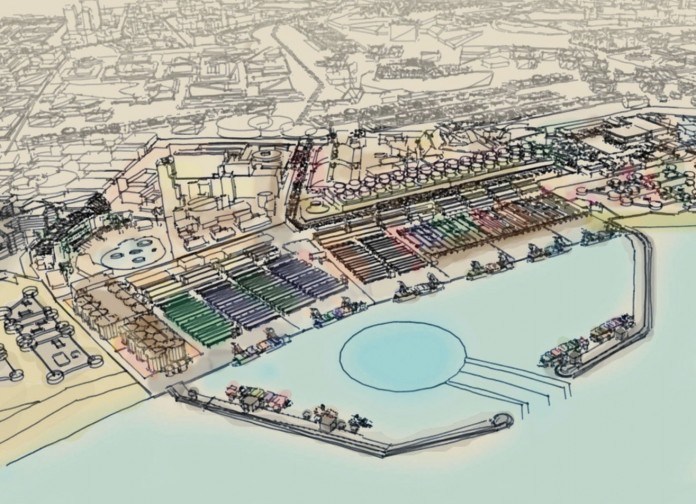
China Loses Bid for Construction of Georgian Deep-Water Port on Black Sea
Publication: Eurasia Daily Monitor Volume: 13 Issue: 39
By:

On February 8, Georgian Prime Minister Giorgi Kvirikashvili personally announced the conclusion of the tender for the construction of the Anaklia deep-water port on Georgia’s Black Sea coast. His remarks were broadcast live on all national TV channels. The prime minister stated that Anaklia Development Consortium, LLC, a joint venture of Georgian TBC Holding and US infrastructure developer Conti Group, is set to carry out the construction work (Agenda.ge, February 8). The overall investment into the project is estimated at $3.7 billion. When completed, the Anaklia port will handle 100 million tons of cargo per year and is planned to be built in stages within the next ten years. The port should receive its first cargo already in 2019 (Georgiatoday.ge, Anakliadevelopment.com, February 8).
Experts were surprised by the government’s decision (see EDM, March 25, 2015; September 8, 2015; see below). The majority of specialists who have studied the issue are convinced that the competing bid involving two Chinese companies—Power China–Hubei Hongyuan Power Engineering Company, Ltd and China Harbour Engineering Company, Ltd (the latter of which dropped out in May 2015)—with the Chinese government’s backing, was actually the most viable. China was considered the preferred partner because the construction of the port in Anaklia would explicitly be part of Beijing’s new “Silk Road” trans-Eurasian transit development policy.
The overland route from China to Europe via Georgia, which is currently under development, was tested at the end of last year. A train from eastern China traveled first to Kazakhstan; then, the containers with Chinese electronic devices were put on ships and taken across the Caspian Sea to Baku, Azerbaijan; in Baku, the cargo was put back on a train, which traveled on to Europe via Azerbaijan, Georgia and Turkey. Despite what looks like a complicated route, this ground transportation alternative is much shorter than the sea route. The prime minister of Georgia at the time, Irakli Garibashvili, met the first Chinese train at a Tbilisi railway station, noting that the Silk Road will cut cargo travel time from the Pacific to Europe by five times, as compared to the sea route (Rbc.ru, December 13, 2015).
Georgian authorities did not mention that the all-land railway route via Russia remains the most comfortable ground transportation route for Chinese exporters to Europe. Yet, China develops several alternative routes for political reasons. An analyst with the independent news agency GHN, David Avalishvili, told this author: “China is concerned about Moscow’s endless conflicts with its neighbors, including disputes over transit. China is especially worried about the Russian-Ukrainian military conflict as well as disagreements that periodically surface between Russia and Belarus and the Baltic states. Apart from that, an alternative railway route would become an important bargaining chip for China in its tariff negotiations with Russian Railways” (Author’s interview, February 20). Avalishvili noted that it would have been much more sensible to award the contract for the construction of the Anaklia port to a Chinese company, since it would become an important logistics point in the transportation route connecting Europe and China via the South Caucasus and be backed by the Chinese government.
The announcement of the results of the competition was postponed several times. After a long period of negotiations, the Georgian government awarded the contract to build this strategically important port facility to Anaklia Development Consortium. According to the official explanation, the winner of the tender offered the government better conditions for the construction of the port and will provide more employment to the local population than the Chinese bid would have (Tabula.ge, February 8).
For China, the construction of the Anaklia port would have made sense as part of its strategy for the implementation of the Silk Road project. But now, without Beijing’s direct involvement, this will be more difficult to achieve. And economist Giorgi Khukhashvili thinks that the development of the Silk Road may encounter other difficulties, too: “The transportation infrastructure in Georgia, Azerbaijan, the Caspian Sea and in Kazakhstan will not be able to carry 100 million tons of goods per year. For example, Georgian railways cannot service such throughput. These problems could have been solved only with significant interest from and active participation of the Chinese state. Yet the Georgian government made another decision” (Author’s interview, February 20).
The previous version of this article incorrectly stated that Timur Korchava was involved with Anaklia Development Consortium. In fact, Mr. Korchava does not and never had any role in Anaklia Development Consortium. We apologize for the error.




